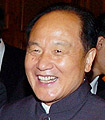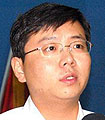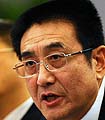|
Mideast Envoy Proposes Course Change

Wu Sike, Chinese special envoy on the Middle East issue, has called on all parties concerned to establish a long-term mechanism for peace negotiations, which he said is more effective than separate meetings.
On his first trip to the Middle East since assuming office this March, Wu suggested Palestinians and other Arab nations seriously consider Israeli Prime Minister Benjamin Netanyahu's recent speech in which he urged a demilitarized Palestinian state to recognize Israel as a Jewish homeland. Wu said that the two-state solution has become the common viewpoint of the international community in solving the Palestinian-Israeli conflict.
Despite Arabs' opposition to Netanyahu's stance on Jerusalem and refugees' right of return, Wu said, "What Netanyahu said in his speech should not be regarded as the conditions for renewing peace talks. Reconciliation and concessions should be attained through negotiations, that is the sole way out."
Wu, former Chinese Ambassador to Saudi Arabia and Egypt and also the first Chinese plenipotentiary representative to the Arab League, visited Egypt, the Palestinian territories, Israel, Jordan, Syria, Lebanon and Russia from June 20 to July 4.
Youthful Mayor Arouses Debate

A graduate of prestigious Tsinghua University, Zhou Senfeng, was elected mayor of Yicheng, central Hubei Province on June 21, making him one of the youngest mayors in China.
The 29-year-old man was elected head of the county-level city through anonymous voting in a plenary session of the local People's Congress.
Originally from Yuzhou, neighboring Henan Province, Zhou earned his master's degree in management science and engineering in 2004, and was named vice mayor of Yicheng under the jurisdiction of Xiangfan Prefecture in 2008, five years after graduating. He was promoted to acting mayor of the city in mid-2009.
Zhou's success at such a young age is due to his outstanding accomplishments, though he maintains a low profile. Zhou's quick rise to fame has, however, aroused much heated debate on the Internet about his youth and alleged inexperience.
Banker Champions Private Business

Liu Kegu, former Vice President of China Development Bank, one of the country's three policy lenders, has proposed that the government promote the development of a grassroots banking system to quench the capital thirst of small and medium-sized companies.
As the Chinese economy accelerates, a sprawling private business sector is emerging. But due to shortages of tangible mortgage guarantees and substandard accounting statements, Liu said, most of these businesses are suffering from financing difficulties, because commercial banks' prime targeting groups are state-owned enterprises or government-sponsored projects.
Based on Liu's survey, small and medium-sized enterprises account for 99.8 percent of all domestic companies, with a disproportionate 15 percent depending on bank loans as a major source of funds. More township financial institutions, especially small-business-oriented ones, are desperately needed, said Liu, adding that large commercial banks should have special sections to deal with small loans.
Liu, 62, is a veteran banker. He also worked at the Ministry of Finance in the early 1990s.
"The main objective of China's relevant export policies is to protect the environment and natural resources. "
China's Ministry of Commerce in a statement, defending the country's newly imposed export restrictions on raw materials in line with rules of the World Trade Organization
"We told the American side that the issue of Taiwan arms sales is a major reason for the constant stop-start course of China-U.S. military relations."
Lieutenant General Ma Xiaotian, Deputy Chief of Staff of the Chinese People's Liberation Army, at the 10th round of Sino-U.S. defense consultations, the first highest-level defense dialogue since the Obama administration took office, on June 24
"Anxiety, and a little bit of doubt."
Zou Xue, a flight attendant at Sichuan Airlines with an accumulated 6,500 flying hours, describing her feelings before taking off on the first China-assembled Airbus A320
"It is appropriate to guarantee unrestricted passage of foreign ships as a maritime state."
Japanese Foreign Minister Hirofumi Nakasone, denying a report by Kyodo News quoting former Japanese vice foreign ministers that Japan decided to set a narrow limit for its territorial waters along five key straits to avoid political issues arising from the passage of U.S. warships carrying nuclear weapons
"Yes, we have a problem with our public finances. Yes, we have a problem with our deficits. But that is not the way to tackle the problem."
French President Nicolas Sarkozy, ruling out any tax increase or "austerity measures" to balance public spending in his "state of the union" address on June 22. Though France's public deficit is set to exceed 7 percent of gross domestic product in 2009, Sarkozy said that tax hikes would slow France's recovery | 